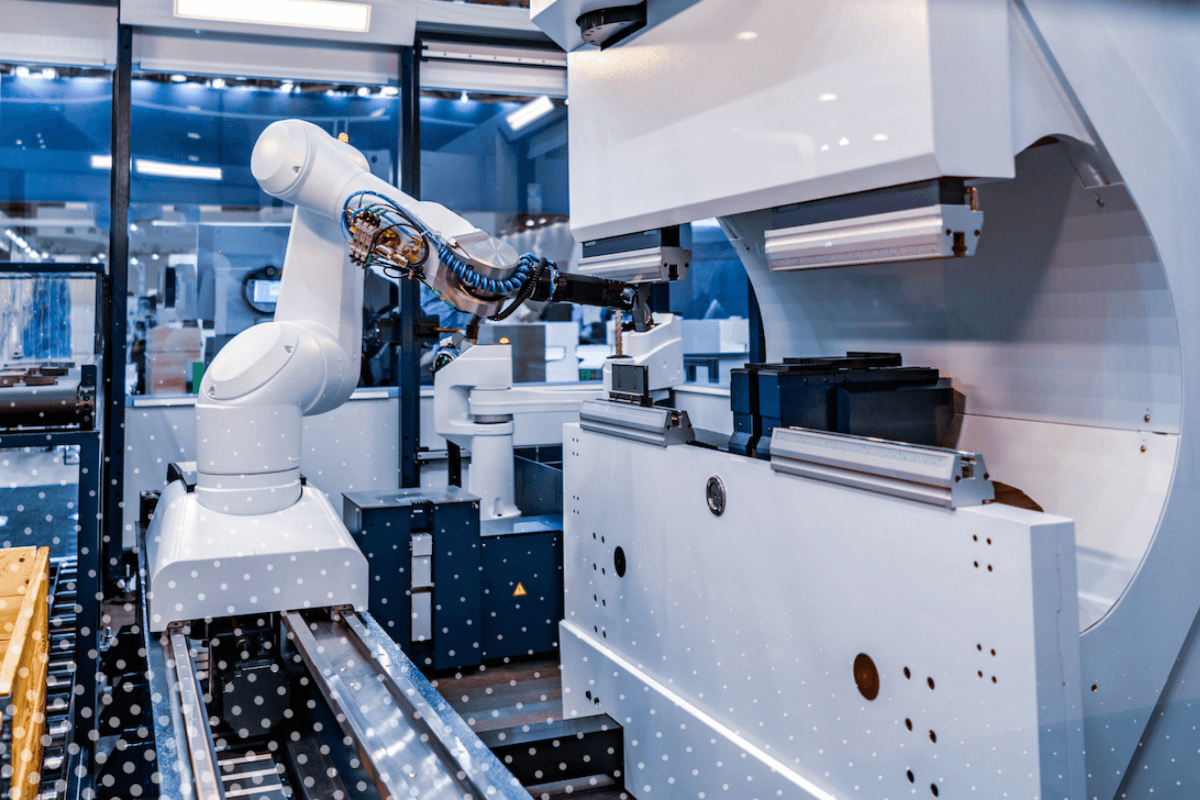There’s no shortage of technological buzzwords these days. From crypto to augmented reality to AI to blockchain, it’s tough to know when it’s worth leveraging these technologies for your business.
Blockchain is a particularly attractive technology to manufacturing businesses because of its ability to be applied to any number of business processes, plus its innate security and reliability.
In this piece, we’ll explore what blockchain really is, how blockchain adoption can revolutionize the manufacturing sector, and how it’s being used now to improve everything from supply chain management to contract enforcement with supply chain partners.
What is blockchain?
For the technological powerhouse that blockchain has become, it’s actually a fairly simple system. The name itself is an apt description: data, which can be identified as the “block,” is stored in a decentralized database, or the “chain.”
More specifically, blockchain consists of a decentralized ledger of transactions, which all users, known as nodes, have access to. Keep in mind that “transactions” here don’t necessarily mean financial transactions; instead, it refers to changes made to the existing data.
Anytime a change is made to the ledger, the node making the change is visible to all users. The other nodes on the network must validate the change. Then, once the change is approved, it is time-stamped, cryptographically signed, and added as a new block to the ongoing blockchain and cannot be further altered by any party. This makes it a great choice for peer-to-peer sharing and record-keeping of any changes.
The origins of blockchain technology lie in the financial services industry with the creation of Bitcoin, a cryptocurrency that is now a household name. Blockchain technology is now over a decade old and has only begun to be applied to other industries in the past few years.
While still new in its applications, the potential of blockchain in the manufacturing industry is proving to be immense. At present, it’s being used to leverage other new manufacturing technologies like IoT (Internet of Things), augmented reality, and 3D printing.
How blockchain technology is changing manufacturing
Blockchain can be used to enhance other new technologies, but it’s also being applied to revolutionize basic business functions that will evolve the manufacturing sector as we know it. Blockchain’s innate transparency builds trust among stakeholders at every step of the manufacturing process, from raw material procurement to shop floor operations to distributors of the finished product to customers. It can improve processes like:
- Drafting and enforcing contracts
- Supply chain monitoring
- Counterfeit detection
- Intellectual property management
- Asset tracking and monitoring
- Inventory management
- Quality control
- Regulatory compliance
Blockchain technology streamlines an abundance of business activities that extend a company’s potential time to market. With blockchain applications, supplier order accuracy improves, product quality improves, and delivery rates improve, which ultimately results in higher customer satisfaction and increased revenue.
Benefits of using blockchain in manufacturing
Blockchain may have been originally designed to facilitate cryptocurrency transactions, but the core technology is flexible. Here are some of the many ways blockchain technology is helpful in the manufacturing sector:
Reduction of overhead costs and barrier to entry
The use of blockchain has the potential to dramatically reduce overhead costs associated with being a manufacturing company and, as a result, reduces the barrier to entry as well.
Machines as a service (MaaS) is a blockchain-enabled model that reduces overhead by allowing manufacturers to pay for the output of the machinery that they use rather than purchasing the machine itself. With the introduction of this business model, fledgling manufacturers and designers will be able to get their product to market without having to worry about high start-up costs.
Another major application of blockchain technology that we’ll discuss in the next section is smart contracts. Smart contracts allow for the automation of a number of business activities, from procurement to payments, that otherwise require time and effort from team members whose energy is better applied elsewhere in the company.
Stability and resilience
Business continuity and resilience has been a major focal point for manufacturers over the past year because of COVID-19. While there’s no single “cure” for a crisis like a global pandemic, global blockchain is a great option to help build resilience in a manufacturing business.
A primary feature of blockchain is its decentralization, as it contains a distributed ledger that is accessible to all parties who are members of the network. This means that if one node fails or one party leaves the network, the blockchain can continue to operate as usual. The stability enabled by blockchain technology is an asset to manufacturing companies who are working toward a resilient business model.
Improved trust and transparency
Blockchain is an excellent tool for companies working to build trust among multiple stakeholders. The distributed ledger contains a single unalterable version of information that is accessible to all members of the network at all times. Further, each transaction or change must be verified by the network, enhancing its trustworthiness.
Enhanced security
Part of what makes blockchain unique is the complex cryptographic programming required to solidify the security of the system. Blockchain’s transparency is balanced by requirements for cryptographic signatures on every transaction that enhance protection from tampering. The network’s storage is also decentralized, so cybersecurity threats to the ledger and the data it contains are mitigated.
Examples of blockchain in the manufacturing industry
Blockchain is a flexible technology that is being applied in many processes in dozens of sectors. Here’s just a handful of how it’s being used in manufacturing:
Supply chain management
Blockchain technology is being applied in one of the largest tasks undertaken by manufacturers: supply chain management. Blockchain boosts the track-and-trace function used by many manufacturers to determine past and current locations of materials, parts, and products used in their day-to-day processes. Track-and-traceability improves because of blockchain’s ability to provide a definitive end-to-end path for parts and products, ensuring accuracy and reducing errors in the manufacturing process.
Smart contracts
Smart contracts facilitated by blockchain technology are proving to be a game changer in the manufacturing sector. Instead of utilizing paper contracts or flimsy digitized versions of paper contracts, smart contracts exist as a computer program on a blockchain. All of the benefits of blockchain technology are translated to the smart contract: The contract is inalterable and all parties have access to the contract at all times.
An added bonus to the security of smart contracts is their ability to automate otherwise complex business activities. The data in the terms and conditions, held in the blockchain, can be used to carry out inventory tracking, supply chain monitoring, payment scheduling and processing, and more.
Converting processes that were done manually to automated tasks saves time, effort, and money. With smart contracts, employees’ talents can better serve the company’s goals.
Shop-floor operations
The shop-floor is arguably the most important location in any manufacturing business as well as one of the most difficult spots to optimize. Blockchain is being leveraged to streamline shop-floor operations with minimal disruptions.
For example, blockchain programs are being used to monitor and report the status of individual machinery, allowing operators access to information that can facilitate scheduled maintenance instead of costly emergency maintenance.
Blockchain can even be used to automate service to machinery with a process known as machine-controlled maintenance. With machine-controlled maintenance, a manufacturer partners with a third-party servicer and installs shared software, including a blockchain system, that monitors machinery through a digital twin of the given machine. Blockchain monitoring can detect when scheduled maintenance will be necessary, create a service request, order any parts needed for the machine, and process payment once the order is fulfilled—all without any human input.
Quality control and regulation compliance
Blockchain technology’s intrinsic security and ability to track a single version of a piece of information makes it useful for a manufacturing business’s quality control and regulation compliance needs. Machine-level monitoring and precise track-and-tracing of materials and components streamlines the quality control process by minimizing the opportunity for errors to occur. This leads to fewer recalled products, less waste, and greater overall revenue.
Further, the blockchain ledger generates an immutable log of data about machinery, processes, materials, and more. These logs can be used by internal inspectors while auditing to ensure premises are safe and regulations are being followed. In the case of an external inspection, the logs can also be provided as evidence of compliance.
How to get started with blockchain in your manufacturing business
Blockchain solutions are an attractive option to alleviate common manufacturing pain points ranging from onboarding providers to distributing finished products to customers. However, the application of blockchain in a manufacturing business is no easy task—it requires technical expertise that is currently in high demand and, as a result, can be an expensive undertaking.
Because of this, it’s important to know when blockchain is not the best solution for your business. For example, blockchain currently lacks the speed needed to execute tasks that require real-time data, like machine automation. Additionally, the code required to structure blockchain’s security features is complex, making it unsuitable for advanced analytics.
Another element to consider are regulations in the countries where you do business. Some countries do not yet consider smart contracts as legitimate or have laws in effect that govern the storage of sensitive data, both of which are major applications for blockchain technology.
With all of that in mind, if you’re interested in finding where in your business blockchain platforms can be applied, conduct a thorough assessment of processes like contract management, machine monitoring, or supply chain management. Upon finding opportunities for improvement, evaluate how blockchain can alleviate those pain points.
Once you’re ready to tackle the project, research enterprise blockchain solutions like IBM Blockchain. These solutions have specialized products for different industries that integrate with your cloud-based manufacturing software ecosystem like Propel.
To keep up with the ever-changing technological landscape and advancements in the manufacturing industry, subscribe for insights delivered to your inbox weekly.



%20is%20Transforming%20Product%20Experiences.png)









.png)


